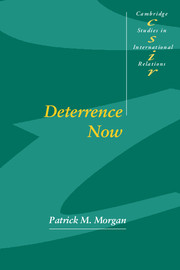Book contents
- Frontmatter
- Contents
- Acknowledgments
- List of abbreviations and acronyms
- Preface
- 1 History: deterrence in the Cold War
- 2 Deterrence and rationality
- 3 General deterrence
- 4 Testing, testing, one … two … three
- 5 Collective actor deterrence
- 6 The revolution in military affairs and deterrence
- 7 Deterrence in the post-Cold War world
- 8 Some conclusions
- References
- Index of names
- Index of subjects
- CAMBRIDGE STUDIES IN INTERNATIONAL RELATIONS
1 - History: deterrence in the Cold War
Published online by Cambridge University Press: 22 September 2009
- Frontmatter
- Contents
- Acknowledgments
- List of abbreviations and acronyms
- Preface
- 1 History: deterrence in the Cold War
- 2 Deterrence and rationality
- 3 General deterrence
- 4 Testing, testing, one … two … three
- 5 Collective actor deterrence
- 6 The revolution in military affairs and deterrence
- 7 Deterrence in the post-Cold War world
- 8 Some conclusions
- References
- Index of names
- Index of subjects
- CAMBRIDGE STUDIES IN INTERNATIONAL RELATIONS
Summary
Deterrence is an old practice in international politics and other areas of behavior. It has been given plenty of thought and study, yet is not easy to understand or explain. The onset of the Cold War provoked enormous interest in deterrence because its role in international politics, particularly at the global level, promised to be critical. However ancient it is in some ways, the greatest part of what we think we know about it was gleaned in the last six decades of systematic thinking and research on deterrence. I won't inflict a lengthy review of its modern history. However, certain comments about deterrence theory and deterrence during the Cold War will be useful for what comes later. I briefly outline what we thought we were doing in managing the Cold War via nuclear deterrence and assess, briefly, the actual role it played in preventing another great war. What the parties thought they were doing was not always what they were doing and the role of nuclear deterrence was not entirely what it seemed. For those familiar with all this, apologies and a request that you grimace and bear it.
The origins of Cold War deterrence
The essence of deterrence is that one party prevents another from doing something the first party does not want by threatening to harm the other party seriously if it does.
- Type
- Chapter
- Information
- Deterrence Now , pp. 1 - 41Publisher: Cambridge University PressPrint publication year: 2003

